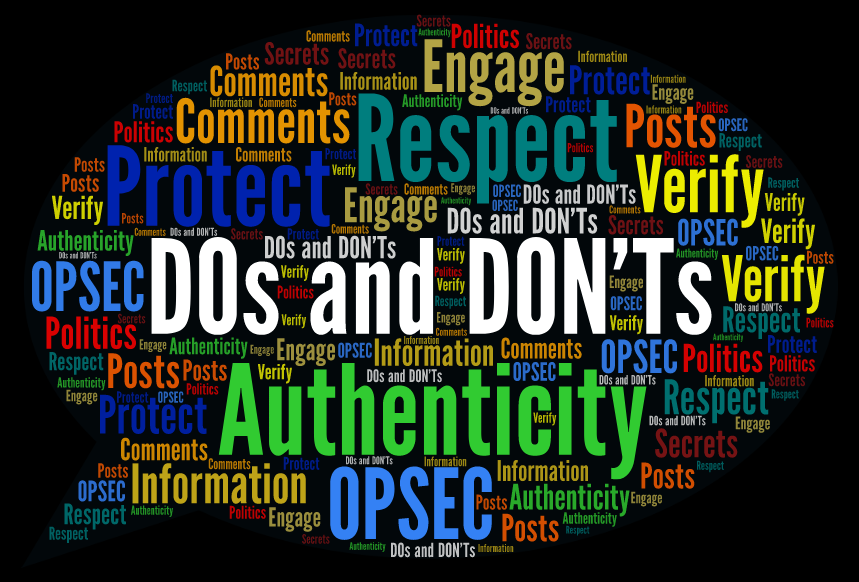Social Media Dos and Don’ts
Essential Dos and Don’ts

Do and Don’t Essentials:
DO 
-
Live the U.S. Army values.
Online misconduct is punishable under the Uniform Code of Military Justice (UCMJ). ALARACT 122/2015, Professionalization of Online Conduct, reinforces AR 600-20 and defines cyber misconduct as “the use of electronic communication to inflict harm; examples include, but are not limited to: libel, slander, harassment, bullying, hazing, stalking, discrimination, retaliation, or any other types of misconduct that undermines dignity and respect.”
-
Assume anyone can see what you post.
-
Be cautious with the personal information you share.
Criminals and adversaries can easily piece together information you share, potentially harming you, your loved ones, fellow Soldiers, or our mission. Safeguard yourself and those close to you by not posting personal contact information or sharing plans and schedules. Tum off electronic functions such as GPS or geotagging and always optimize your security settings.
DON’T 
-
Do not use trademarked or copyright-protected material.
Posting or sharing music, logos, songs, or other information that is protected by copyright, trademark, or any other restriction is illegal. Restricted materials can only be shared with express permission from the owner.
-
Do not misrepresent your identity.
Misrepresentation of your identity by disguising yourself or impersonating others is prohibited and is punishable under the UCMJ.
-
Be aware of the image you present.
Do not discredit yourself, your family, your organization, or your Army by using inappropriate language or content. Only post or discuss issues related to your professional expertise or personal experience. Remember, your behavior online is reflective of your Army’s image.
-
Do not post political propaganda.
Always practice good OPSEC
DO 
-
Ensure information you post or share is releasable.
It is imperative that you are aware of potential security violations when posting online. It is never acceptable to post classified, For Official Use Only (FOUO) or pre-decisional information on an official or personal account. It is your responsibility to be aware of the classification and releasability of the material you post.
DON’T 
- NEVER tell secrets.
- Do not give actual numbers of troops.
- Do not discuss current troop movement.
- Do not speculate.
- Stay away from details such as dates, jobs, etc.
Stay within the Law
DO 
- Always give people proper credit for their work. Make sure you have the right to use something with attribution before you publish. Be careful with art, imagery & music.
- Always protect sensitive information, such as protected acquisition and personally identifiable information.
- Respect copyright, privacy, fair use, financial disclosure, and other applicable laws.
DON’T 
- Do not post comments, photos or videos that suggest or encourage illegal activity.
- Do not post details about an ongoing investigation or legal or administrative proceeding that could prejudice the processes or could interfere with an individual’s rights.
- Do not post copyrighted or trademarked images, music video or graphics. Posted material should be owned by the user, the U.S. Army or the DoD.
- Avoid commenting on anything related to legal matters, litigation, or any parties the U.S. Army may be in litigation with.
- Do not publish or report on conversations that are meant to be pre-decisional or internal to the U.S. Army unless given permission by your chain of command.
Be careful with accounts
DO 
- Utilize two-factor authentication.
- Ensure you are using the official channel and have not toggled to your personal account for official use or vice versa.
- Take responsibility for your comments; would you say the same thing if you were looking that person in the eye? Think twice before summoning keyboard courage.
- Make sure responses are vetted / approved and accurately express the U.S. Army’s and TRADOC’s position without editorializing or straying from the facts. (Contact your Public Affairs Office.)
- Only delete or block comments or users when a clear pattern of malicious, derogatory behavior is apparent and they are in violation of the terms of participation.
- Keep a log of all malicious material which has been deleted.
DON’T 
- Don’t login or link to third-party sites using your Facebook account; be very wary of sharing personal posts on official accounts.
- Don’t shy away from responding to negative comments; that can tarnish credibility.
- Don’t be overbearing as you engage. Let other people fight your battles.
Always Remember:
- Social media has hundreds of privacy and sharing options. You control how information is shared/viewed.
-
If you feel threatened or feel that you or a member of your Family needs help:
Ask for help if you or a Family member have fallen victim to a scam, impersonation, or feel threatened. Contact the local civil authorities or the U.S. Army Criminal Investigation Command for assistance and to report a scam, impersonation or threat.